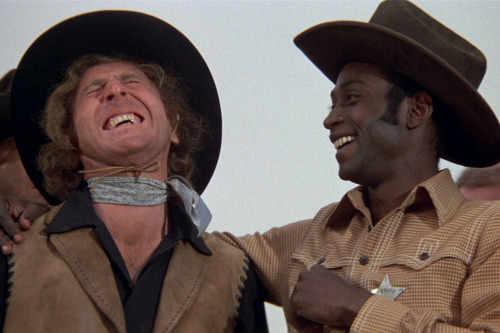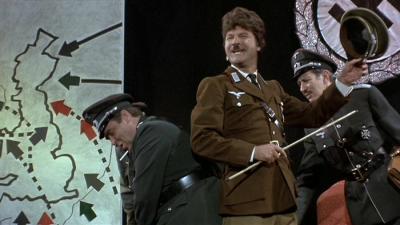A few friends and I started a club as a means of keeping in touch. One of us will choose a director and together we'll go through that director's films one at a time and talk about them. Currently, we're going through the career of comedy legend, Mel Brooks, and what better place to start than with his first film, 'The Producers.'
The Producers serves as Mel Brooks' debut and what a debut it is. While most people think of Brooks as a parodist, there was a period, however briefly when he made comedies that worked as their own movies.
The story is absolute genius. A once-great producer MAX BIALYSTOCK teams up with a nebbish accountant LEO BLOOM with a cockamamie scheme, namely that if they raise a ludicrous amount of money and they put on a guaranteed flop, they could abscond with the leftover money and retire as millionaires. From a comedic standpoint, this plot is filled to bursting with hilarious opportunities and for the most part, The Producers makes the most out of them.
Zero Mostel plays Max Bialystock and while many know him as Tevye from Fiddler on the Roof, this was the role he was born to play. He's delightfully repugnant as one of the failed giants of his craft. How low does he go? The film begins with him selling his body to little, horny old ladies for "checkies," his sweaty combover barely keeping up with him as he runs from one geriatric tryst to the next.
Gene Wilder has his breakout performance as Leo Bloom, a spineless accountant with a propensity for panic attacks and a slavish devotion to his security blanket. Its his clever hypothetical accounting theory that lays out the plot but its Max Bialystock's desperation, at one point reaching his hands to the heavens and shouting "LORD, I WANT THAT MONEY!" that sets the story into motion. Wilder and Mostel make one hell of a team in this movie and their chemistry is off the charts.
The two set out to find the worst play ever written and they strike gold in "SPRINGTIME FOR HITLER", a concept so audacious, you already know about it by reputation. The author of this masterpiece is Franz Liebkind played by Kenneth Mars, as a Nazi and Hitler devotee who escaped the war and immigrated to the US of A. Play in hand, Bialystock and Bloom assemble the crew for their theatrical catastrophe, including a flamboyantly gay director, Joel Schumacher before Joel Schumacher, Roger De Bris. His utter creative bankruptcy is one of the consistent laughs throughout the film.
The only sour note is Dick Shawn as Lorenzo St. DuBois or LSD for short (get it?). He's a beatnik so terrible he just has to be right. However, he is representative of all the problems I have with the second act.
WARNING! HERE BE SPOILERS!
After LSD joins the cast, the pacing goes down the tubes, the slowest moment being LSD's musical number "Love Power" which is so boring and drawn out that it is completely absent from the Broadway Musical. Indeed, Lorenzo's character has been excised entirely.
The play opens to everyone's predictable outrage with Wilder and Mostel exiting before any of the angry patrons. They leave a hair too early though because as soon as LSD sets foot on stage, his hippy portrayal of the mustachioed dictator has the audience in (unbelievable) stitches. This is where I am going to disagree with people but I firmly believe that the scenes in the theater threaten to destroy the movie entirely. Why? Because the manner in which the play is presented makes no sense. "Oh shush, Lukas. It's a comedy." you say. But the core concept is flawed. Roger DeBris intends to make a sincere, dramatic work. His problem is that he's such a poor director that even when he intends to be serious, he falls back on his tired, old, and lets not be coy about it, gay clichés. But what I don't understand is how LSD made it all the way to opening night with that performance accepted by DeBris and with the Kraut being none-the-wiser. LSD is terrible, undoubtedly, but he's too terrible.
Some will say that I'm overanalyzing a simple joke, but allow me to point you to the remake, which is almost word for word the original film, but with musical numbers and a dramatically restructured second act. As mentioned before, in the musical there is no LSD. Leibkind is cast as his beloved Führer and intends to play the role with all the sincerity he can muster. However, on opening night, he breaks his leg and can't go on. He is replaced last minute... by Roger DeBris! This is an ingenious change. 'Springtime For Hitler' now takes on a different satirical edge. DeBris doesn't know he's awful. His homosexuality shines through. He is utterly incapable of playing the part straight.
The rest of the musical is very similar to the movie, except for a few character changes. Leo having a secret desire to be a Broadway Producer adds some complexity and depth to an otherwise shallow role but apart from that it's basically verbatim. And why should it change? The screenplay for Mel Brooks' comedy is downright untouchable. It has a reputation for being one of those great comedies and its entirely deserved. You've heard lines from this movie without even knowing it. "Actors aren't animals? Have you ever eaten with one?!"
It is clear that Mel Brooks poured his heart and soul into this project and it really is required viewing for anyone who says they like comedy. With movies like "Young Frankenstein" and "Robin Hood: Men in Tights", Mel Brooks will become one of Hollywood's premier satirists. Its clear, even from his first film, that he has a firm grasp on the concept.






